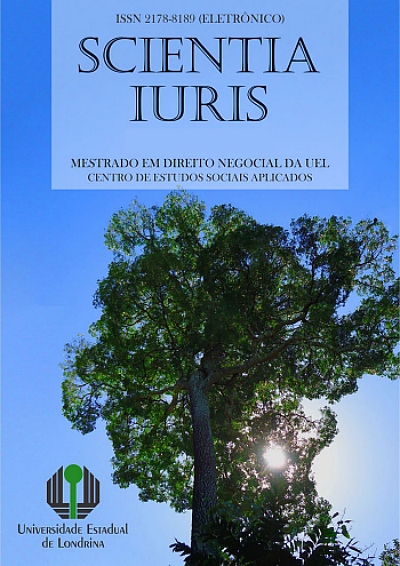The autocomposition of conflicts in the context of civil neoprocessualism and the principle of consensus
DOI:
https://doi.org/10.5433/2178-8189.2018v22n2p85Keywords:
Autocomposition. Neo-constitutionalism. Neo- proceduralism. Principle of consensuality.Abstract
This research analyzes the impacts of fundamental norms present in the 2015 Brazilian Code of Civil Procedure - specifically those regarding consensual dispute resolution, which bases itself on the novel consensual procedural principle. Therefore, this paper explores the fundamental topics of jurisdiction, constitutional procedural principles, and fundamental norms of civil procedure and its transformations over time, in order to analyze their effects within the context of neo-proceduralism and neo-constitutionalism. Moreover, this study utilized the qualitative research method for descriptive and exploratory purposes, in order to investigate, explain and analyze related theories and their repercussion on the very essence of the judicial civil process. Furthermore, currently judicial policy gives priority to autocompositive solution of conflicts, which is impacted by the paradigm shift, now characterized as consensual. This, in turn, represents a deconstruction and reconstruction of the Brazilian legal culture, hence the term "neoprocessalism". In this way, it has impacted the democratization of the Judiciary, as there is active participation of parts in the decision-making process, which can be interpreted as a true exercise of citizenship. In short, this study analyzes and defends the emergence of a novel constitutional procedural principle: the principle of consensuality.Downloads
Download data is not yet available.
Downloads
Published
2018-07-31
How to Cite
Pompeu, G. V. M., & Martins, D. B. (2018). The autocomposition of conflicts in the context of civil neoprocessualism and the principle of consensus. Scientia Iuris, 22(2), 85–114. https://doi.org/10.5433/2178-8189.2018v22n2p85
Issue
Section
Artigos
License
Copyright (c) 2022 Scientia Iuris

This work is licensed under a Creative Commons Attribution 4.0 International License.
The journal reserves the right to modify, in the original text of the submitted article, normative, spelling and grammatical mistakes in order to maintain the cultured standard of language and the credibility of the journal. The journal will respect the authors' writing style. Changes, corrections or suggestions of conceptual order will be sent to the authors, when necessary. In such cases, the articles will be re-examined. The final exams will not be sent to the authors. The published works become the property of the journal, in other words, its total or partial reprinting is subject to the express authorization of the journal. In all subsequent citations, the original source of publication shall be cited and in the case of Photographic Speeches, shall be approved by the original author. The opinions expressed by the authors of the journal's articles are of their sole responsibility.

















